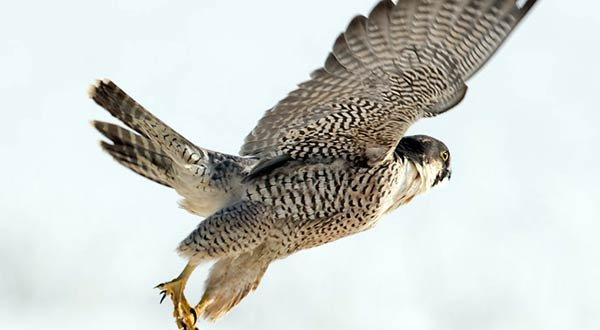“Uqaabi rooh jab bedaar hoti hai jawanon mein; / Nazar aati hai un ko apni manzil aasmanon mein.” (When a falcon’s spirit awakens in youngpeople; / They see their luminous goal beyond the starry heavens.)
“Nahin tera nasheman qasr-e-sultani ke gunbad par; / tu Shaheen hai, basera kar paharon ki chatanon mein.” (It’s not among the domes of the empire’s palaces that your abode lies; For you are falcon, so make then your abode among the high peaks of the lofty mountains.)
“Tundi-e-baad-e-mukhalif se na ghabra aye uqaab; / Yehtoa chalti hai tujhay ooncha uranay ke liye.” (You don’t get frightened of these furious, violent winds, Oh falcon! / These blow only to make you fly higher.)

Iqbal wants his youth to have the best knowledge – the knowledge of the Quran.
These philosophical, thought-provoking and inspiring expressions are from the poetry of Sir Dr Mohammed Iqbal, one of the most outstanding poet-philosophers of the modern era. In these couplets, Iqbal addresses the Muslim youth, likening them to the falcon that flies tirelessly in the skies and motivating them to inculcate in themselves the qualities of the Shaheen, an eagle-like bird.
Iqbal was born in undivided India on November 9, 1877, in a town that went to Pakistan after the subcontinent was partitioned in 1947. He died in 1938. Commonly known as the Poet of the East and Hakeem-ul-Ummat (sage of the global Muslim community), Iqbal’s works in Urdu, Arabic and Persian are considered to be among the greatest of the modern era. A doctorate in philosophy, Iqbal was knighted in 1922 by King George V, who gave him the title of “Sir”.
Referred to as Allama (scholar), Iqbal was a strong proponent of the spiritual and political revival of Islamic civilisation and culture. He encouraged the creation of a “state in north-western India for Indian Muslims”, which ultimately gave birth to Pakistan, where he is officially recognised as the “national poet”. In India, Iqbal is best known for his patriotic song ‘Tarana-e-Hindi’, Saare jahan se achcha hindostan hamara… (Better than the entire world is our India…) Written originally for children, the song has remained popular in India for over a century.
Iqbal was educated initially by private tutors in languages and writing, history, poetry and religion. He became proficient in several languages and the skill of writing prose and poetry. Iqbal entered the Government College in Lahore where he studied philosophy, English literature and Arabic, and obtained a Bachelor of Arts degree in 1892, graduating cum laude.
While studying for his master’s, Iqbal came under the wings of Sir Thomas Arnold, a scholar of Islam and modern philosophy at the college. Sir Arnold exposed young Iqbal to Western culture and ideas, and served as a bridge for him between the ideas of the East and West. At Sir Thomas’s encouragement, Iqbal travelled to Europe and spent many years studying there. He obtained a Bachelor of Arts degree from Trinity College in Cambridge in 1907, while simultaneously studying law at Lincoln’s Inn, from where he qualified as a barrister in 1908. The same year he returned to India.
While in Europe, Iqbal started writing poetry in Persian as well. Iqbal preferred writing in Persian as he believed it allowed him to fully express philosophical concepts and gave him a wider audience.
Iqbal’s thoughts in his work primarily were focused on the spiritual direction and development of human society, and centred on experiences from his travel and stay in Western Europe and the Middle East. He was profoundly influenced by Western philosophers such as Friedrich Nietzsche, Henri Bergson and Goethe, and soon became a strong critic of the Western society’s separation of religion from state and what he perceived as its obsession with materialistic pursuits.
The poetry and philosophy of Maulana Rumi, a 13th century Persian Muslim poet, jurist, theologian and sufi mystic, bore the deepest influence on Iqbal’s mind. Deeply grounded in religion since childhood, Iqbal would begin intensely concentrating on the study of Islam, the culture and history of Islamic civilisation and its political future, and embraced Rumi as “his guide”. Iqbal would feature Rumi in the role of a guide in many of his poems, and his works focused on reminding his readers of the past glories of Islamic civilisation, and delivering a message of a pure, spiritual focus on Islam as a source for socio-political liberation and greatness. Iqbal denounced political divisions within and among Muslim nations, and frequently alluded to and spoke in terms of the Ummah.
FOCUS ON YOUTH
Iqbal was deeply concerned with the Muslim youth of that time. He was very much clear to the fact that if youth had focused on their real destiny, then they could have led the Muslims of the subcontinent out of the danger of destruction earlier than they did.
Iqbal’s youth is True Muslim, Mard-i-Mu’min (man of perfect faith), Mujahid (always struggling in the way of Allah), man of khudi (the Self), and optimistic.
He says: “I have love for those youngsters who pull the stars down.”
Iqbal’s youngster is a creative youngster. He is the falcon who hunts and then takes. Iqbal says: “Your world is (only) the one which you create yourself, / Not these stones and bricks, which are in sight.”
The youth provide the leadership that leads the nation to the heights of self-determination. Iqbal’s notion of leadership is best exemplified in his concept of Mard-i-Mu’min when he says:
“He (mu’min) is mild in speech and wild in action; / Be it battlefield or the assembly of friends, he is pure of heart and action.”
He further says:
“The destiny of nations is vested with the individuals. / Similarly every person belonging to the Muslim Ummah is its destiny’s star.”
In Iqbal’s sight, the youth represent the nation, not only the current nation but also the nations to come, i.e. they will set a stage for next generations. Iqbal’s youngster is a Muslim leader and a Mujahid, who is equipped with the qualities of a leader mentioned in Surah Al-Baqarah of the Holy Quran. He says if the youth are True Muslims and have these qualities then the nation can prosper, and if it is otherwise then nothing can stop it from being ruined.
Iqbal wants his youth to have the best knowledge – the knowledge of the Quran. This idea is more clearly expressed in the following quartet:
“Keep the Qur’an as a mirror before you. / You have completely changed, (and) run away from yourself.
Fix a balance for your deeds [so that you may be able to], / Stir a commotion which your forbears stirred in the past.”
Iqbal wants the Muslim youth to stop living a life of indolence and accept the challenges of life. He wants them to stay away from the glittering culture of the West, which he says is a blend of matter and material pleasure where lust, selfishness and many other wrongs are prevailing. Therefore, no good could be expected of them.
He says: “Western nations are based on territory and race; Whereas the strength of your community rests on the might of your religion.”
Iqbal inspires the youth thus:
“Burst into song, oh nightingale! so that from your melody; The spirit of the royal falcon may arise in the delicate body of the dove!”
The most significant and certainly the best known image in Iqbal’s poetry is that of the falcon itself. He says: “Live in the world like an eagle, and like an eagle die.”
Iqbal’s youth must be equipped with the Fikr, the thinking of Truth that gives warmth, richness, beauty and charm to one’s life, and that Fikr is Fikr Hijazi.
Iqbal says: “Miracles of life are always the product of innovation in thought and action, / Innovation of thought and action can transform granite into a real ruby.”
Iqbal is optimistic about the Muslim youth when he says:
“But of his barren acres Iqbal will not despair: / A little rain, and harvests shall wave at last, oh Saqi!”
And, finally, Iqbal prays to Allah:
“(Oh God) Bestow on the youth my warmth of feeling; / “My unbounded love, and my vision.”
And:
“Give the young, O Lord, my passionate love for Thee, And give them an eagle’s force to fly and to see;
O Lord, I pray that Thou vouchsafe to them / The power of vision that Thou hast given me.”


